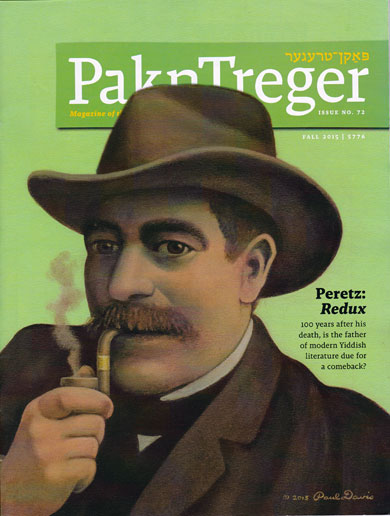The Fall 2015 issue of the Yiddish Book Center’s quarterly magazine, Pakn Treger (a traveling book peddler), was devoted to celebrating the 100th yortsayt of the beloved Yiddish writer, I. L. Peretz. (See Peretz’s Worlds.) Here’s how editor Aaron Lansky, the Center’s founder and president, introduced the issue: “At the time of his death in 1915, I. L. Peretz was, in the words of Ruth Wisse, ‘arguably the most important figure in the development of Yiddish culture.’ Today he is all but forgotten.”

Forgotten! Oy! Only 100 years after his death at 63 in Warsaw, Poland from a heart attack, one of the most creative writers of Jewish short stories is barely remembered today. I see this in my own experience presenting stories by Peretz, Sholem Aleichem, Sholem Abramovitsh, and Jacob Dinezon to Jewish audiences. Only Sholem Aleichem, the writer of the Tevye stories, receives a glimmer of acknowledgment—and often only after a little prompting with a verse from the musical Fiddler on the Roof.
Yet, Peretz’s stories have shaped my values and haunted my imagination since I first read them as a teenager. In his time, Peretz’s great gift was his ability to help his Jewish readers deal with the challenges of modernity as the Jewish Enlightenment began to make its way into the shtetls and great urban centers of Russia and Eastern Europe. As Lansky writes, “Peretz was committed to one premise above all others: it was possible, through literature, to fuse Jewish tradition with Western ideas of humanism, reason, and social justice and to show that those ideas were, in fact, implicit in Jewish tradition all along.”
Peretz’s skill at taking what at first appears to be a simple folk tale and turning it on its head with a modern twist, is still powerfully effective today in stories like “If Not Still Higher,” “Bontshe Shvayg” (“Bontshe the Silent”), “The Three Gifts,” and “What Is A Soul?” Stories that remind us that, though our homeland, fashions, and technologies may have changed over the years, our fundamental Jewish values have not.
Lansky sums it up beautifully: “Peretz was creating the next stratum of Jewish literature, a body of works both audaciously modern and authentically Jewish.” I. L. Peretz is a writer who must not be forgotten.
If you’d like to spend a little time celebrating I. L. Peretz’s gifts as a storyteller, here are two free resources: